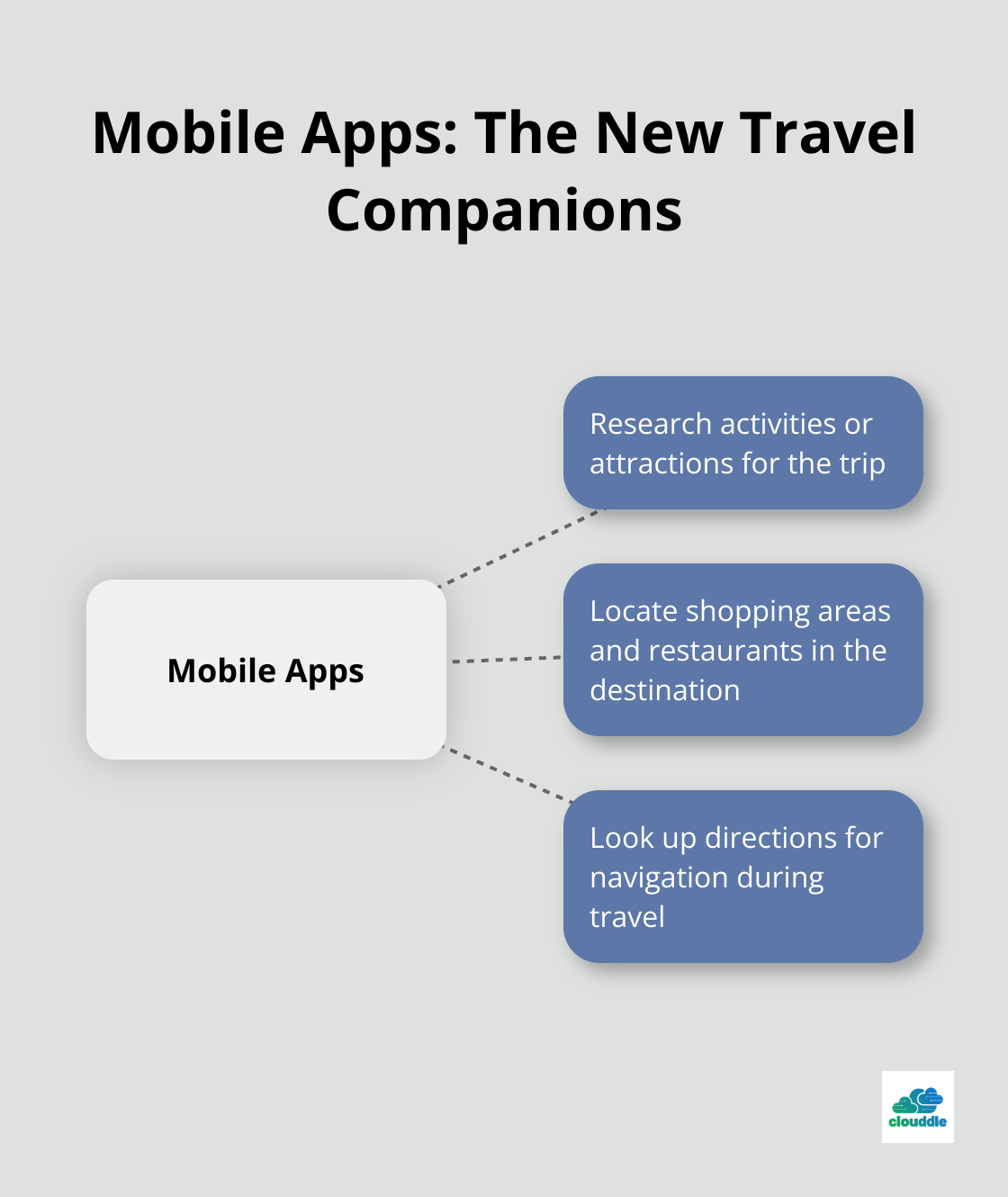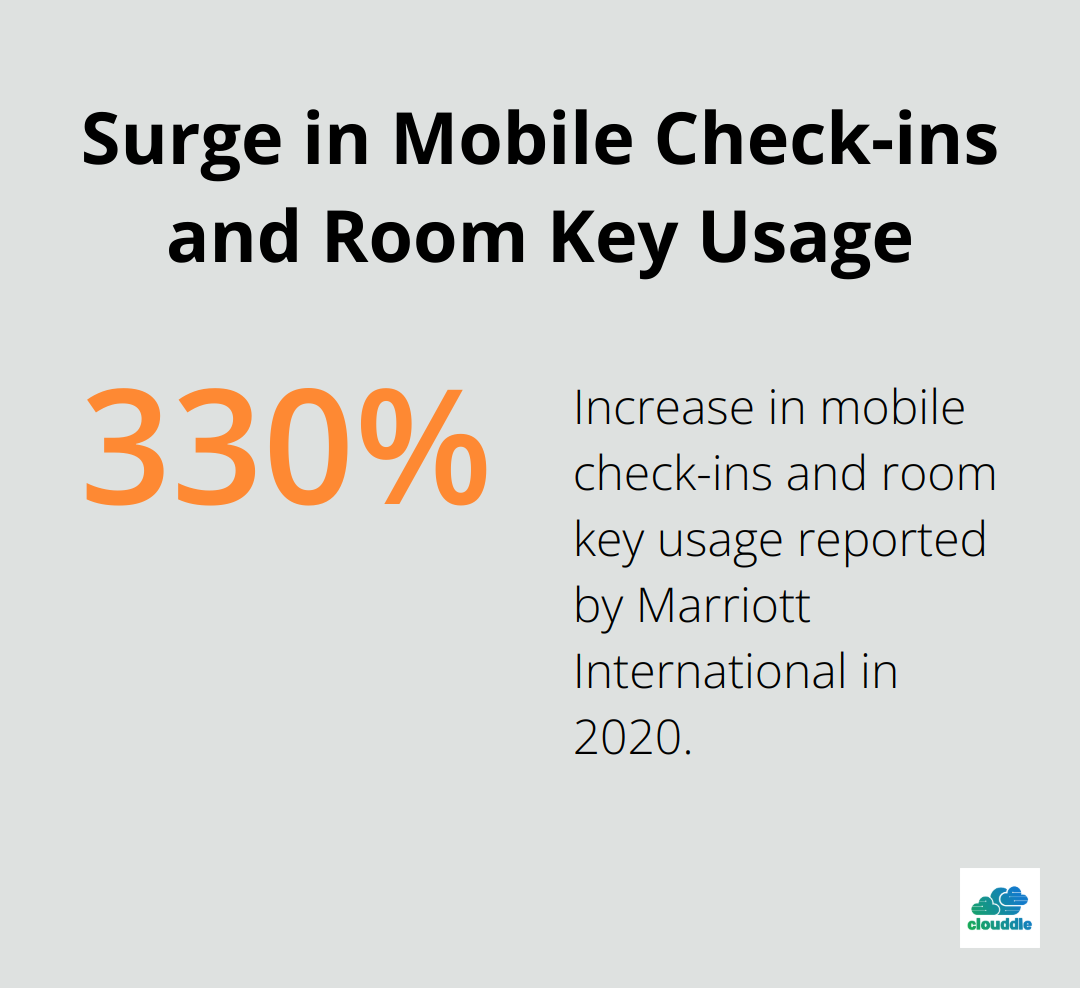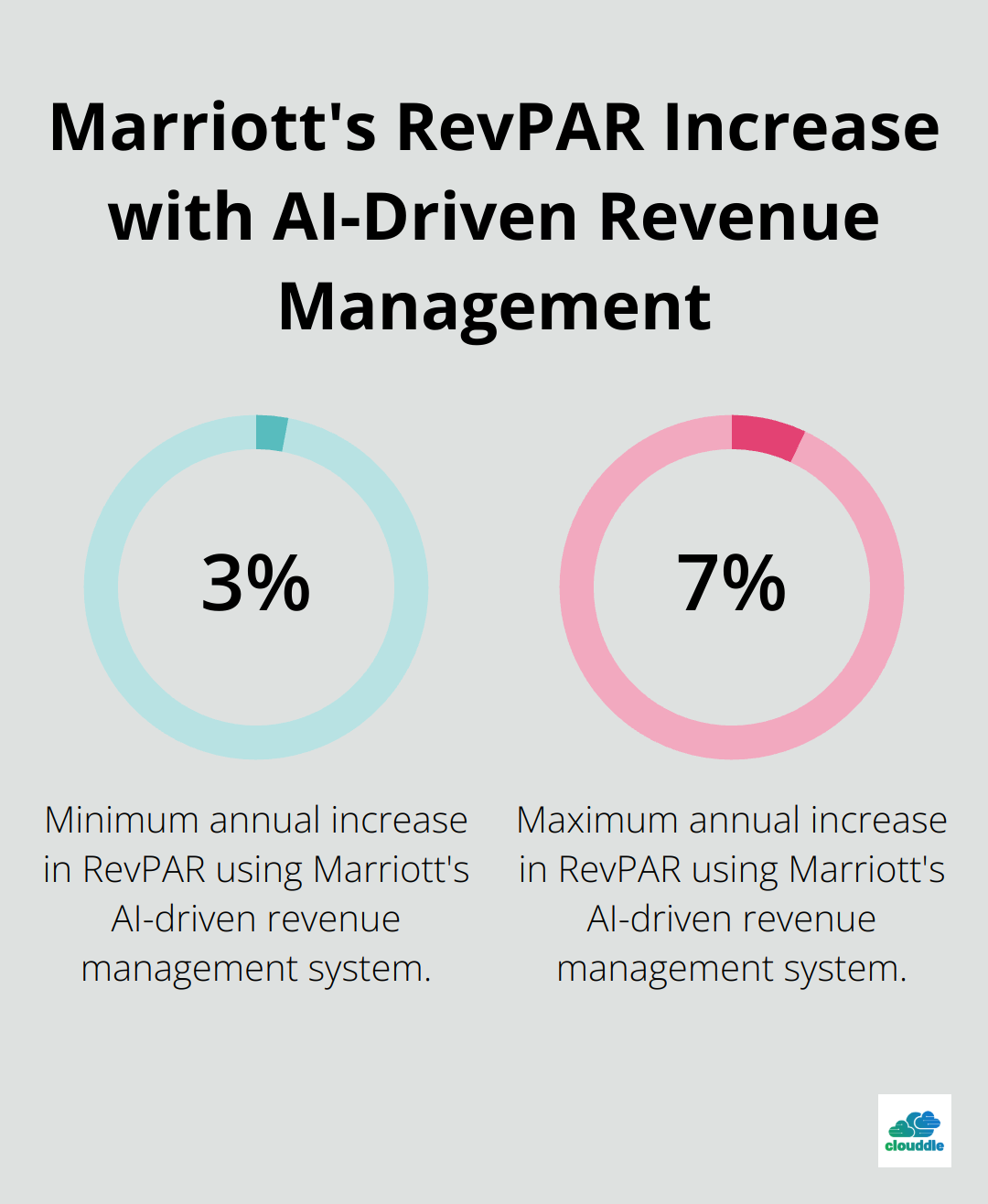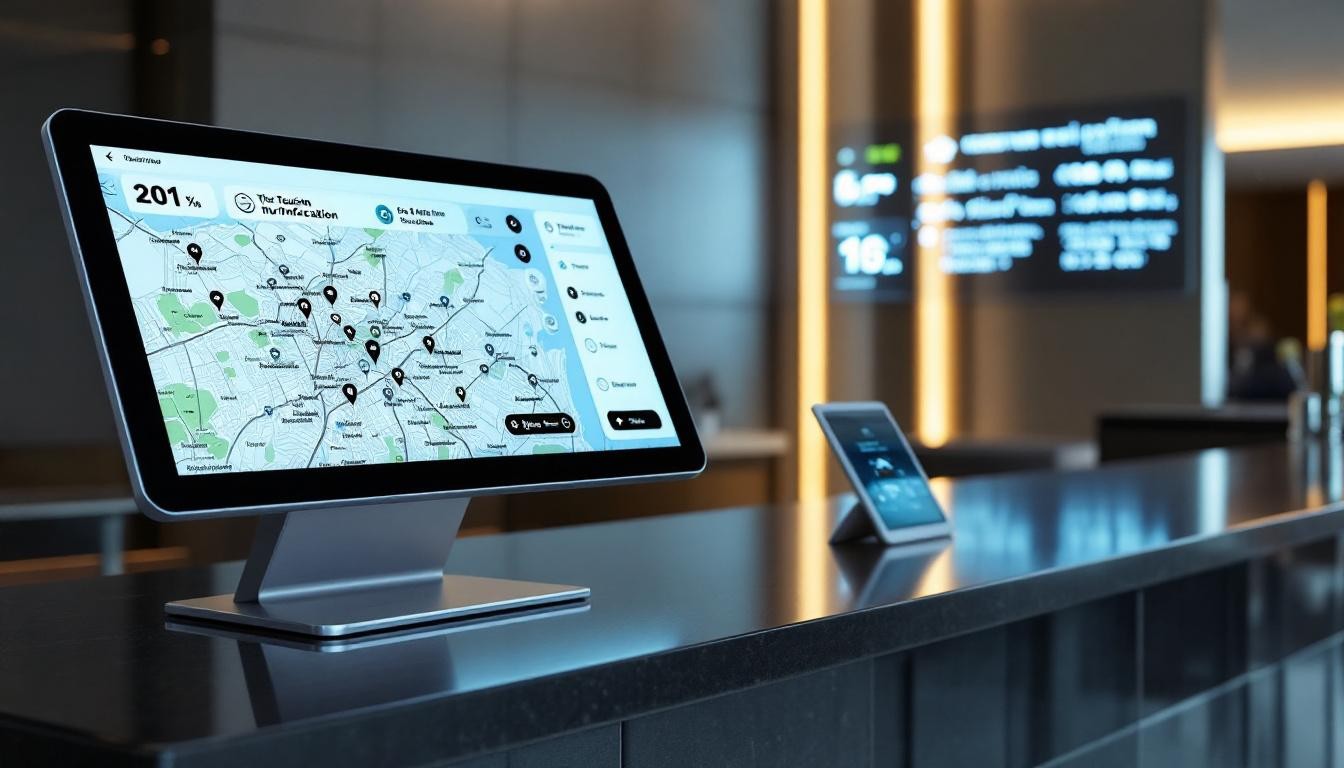Technology has revolutionized the tourism and hospitality industry, transforming how we travel and experience the world. From mobile apps that simplify trip planning to AI-powered chatbots enhancing customer service, tech innovations are reshaping every aspect of the sector.
At Clouddle, we’ve witnessed firsthand the importance of technology in tourism and hospitality industry. These advancements not only improve guest experiences but also streamline operations, making businesses more efficient and competitive in today’s digital landscape.
How Tech Reshapes Tourism
Mobile Apps: The New Travel Agents
Technology has transformed the tourism landscape, redefining how people plan, book, and experience travel. Mobile apps now stand at the forefront of this revolution. Travelers most frequently use mobile devices to research activities or attractions, to locate shopping areas and restaurants, or to look up directions.
Traditional travel agents have given way to apps like Expedia, Booking.com, and Airbnb, which put travel planning directly into consumers’ hands. These platforms simplify bookings, offer real-time updates, user reviews, and personalized recommendations.

AI Chatbots: Round-the-Clock Customer Service
AI-powered chatbots have revolutionized customer service in tourism. Research indicates that when implemented effectively, AI chatbots can positively affect customer satisfaction, engagement, and loyalty. Chatbots can improve customer service by providing instant responses to queries, handling bookings, and offering personalized recommendations 24/7.
Virtual Reality: Experience Before You Travel
Virtual Reality (VR) now offers potential travelers immersive previews of destinations and accommodations. This technology aids decision-making, builds excitement, and sets realistic expectations for travelers.
Augmented Reality: Enhancing Real-World Experiences
Augmented Reality (AR) complements VR by overlaying digital information onto the real world. Tourists can now point their smartphones at landmarks to receive instant information (historical facts, opening hours, etc.). Apps like Google Lens identify objects and translate text in real-time, breaking down language barriers and enriching travel experiences.
The Internet of Things (IoT): Smart Travel
IoT devices have begun to permeate the travel industry. Smart luggage tags allow travelers to track their bags in real-time, reducing the stress of lost luggage. Connected hotel rooms adjust temperature and lighting based on guest preferences, creating personalized environments. These innovations (powered by robust Wi-Fi infrastructure) enhance comfort and efficiency throughout the travel journey.
As these technologies continue to evolve, they will further shape the future of tourism, making travel more accessible, personalized, and engaging. The next frontier lies in how these tech advancements enhance the guest experience once travelers reach their destinations.
How Tech Elevates Guest Experiences
Smart Rooms: The Future of Hospitality
Smart hotel rooms transform the guest experience. These high-tech havens use IoT devices to create personalized environments. Guests walk into rooms with temperature, lighting, and TV presets matching their preferences.
The empowerment of IoT services in the hospitality sector is becoming an important tool to summarize the role of IoT in terms of guest service satisfaction in the hotel industry.
Data-Driven Personalization
Data analytics powers truly personalized guest experiences. Hotels analyze guest preferences and behavior to offer tailored recommendations and services.
The Dorchester Collection uses AI to analyze guest feedback and improve their services. This approach increased guest satisfaction scores by 30% (according to a Deloitte case study).
Frictionless Check-In and Access
Contactless check-in and digital room keys are becoming industry standards. These technologies enhance convenience and address health and safety concerns.
Marriott International reported a 330% increase in mobile check-ins and room key usage in 2020. This surge demonstrates growing guest preference for contactless solutions.

Hotels need robust and secure network infrastructure to implement these technologies effectively. Solutions like Network as a Service (NaaS) provide the backbone for these innovative guest experiences.
Human Touch Enhanced by Tech
The goal of these technologies isn’t to replace human interaction, but to enhance it. Automation of routine tasks allows staff to focus on providing personalized, high-touch service where it matters most.
The Next Frontier: Operational Efficiency
As the hospitality industry continues to push the boundaries of guest experience through technology, the next frontier lies in streamlining backend operations. The following section will explore how tech revolutionizes the operational side of hospitality, creating a seamless experience from check-in to check-out.
How Tech Streamlines Hospitality Operations
Technology transforms more than guest experiences; it revolutionizes behind-the-scenes operations in the hospitality industry. The right tech solutions significantly boost efficiency and profitability.
Cloud-Based Property Management
Cloud-based property management systems (PMS) centralize operations, from reservations to housekeeping, in one accessible platform. The latest PMS advancements are transforming hotel operations and guest experiences, with a focus on personalization, Attribute-Based Selling, and other innovations.
Hilton implemented a cloud-based PMS across its 6,000+ properties. This move cut check-in times by 20% and reduced front desk errors by 40%.
Smart Inventory Management
Automated inventory and supply chain management systems use real-time data to track stock levels, predict demand, and automate reordering processes.
AccorHotels implemented an AI-driven inventory management system across its properties. As a result, Accor’s hotels reduce their annual food waste by 1.6 to 12 tons, depending on the property.
Data-Driven Pricing Strategies
Revenue management now uses machine learning algorithms to analyze vast amounts of data (including competitor pricing, local events, and weather forecasts).
Marriott International’s Automated Revenue Management System processes data from over 3,000 properties to optimize pricing. This system helps Marriott increase revenue per available room (RevPAR) by 3-7% annually.

Network Infrastructure
These technologies require a robust, secure network infrastructure. Solutions like Network as a Service (NaaS) provide the backbone for these innovative operational systems. Clouddle offers NaaS solutions that combine networking, entertainment, and security for seamless operations and increased revenue, all without any initial investment.
24/7 Customer Support
Modern hospitality operations demand round-the-clock support. Tech solutions now offer 24/7 customer service, ensuring issues get resolved quickly at any time of day or night. This constant availability enhances operational efficiency and guest satisfaction.
Final Thoughts
Technology has reshaped tourism and hospitality, transforming every aspect from trip planning to on-site experiences and operations. The importance of technology in tourism and hospitality industry cannot be overstated; it’s now essential for survival and growth in the digital age. Businesses that embrace these advancements position themselves to meet evolving consumer expectations, optimize operations, and lead in a rapidly changing market.
We anticipate more exciting innovations in the future. Blockchain may revolutionize secure transactions and loyalty programs, while the Internet of Things will likely create more interconnected travel environments. Artificial intelligence will continue to evolve, offering increasingly sophisticated personalization and predictive services.
At Clouddle, we help hospitality businesses navigate this technological landscape. Our Network as a Service (NaaS) solutions provide the robust infrastructure needed to support cutting-edge technologies, enabling seamless operations and enhanced guest experiences (without upfront investment). The future of tourism and hospitality is digital, and it’s time for every industry player to embrace this exciting new era.


